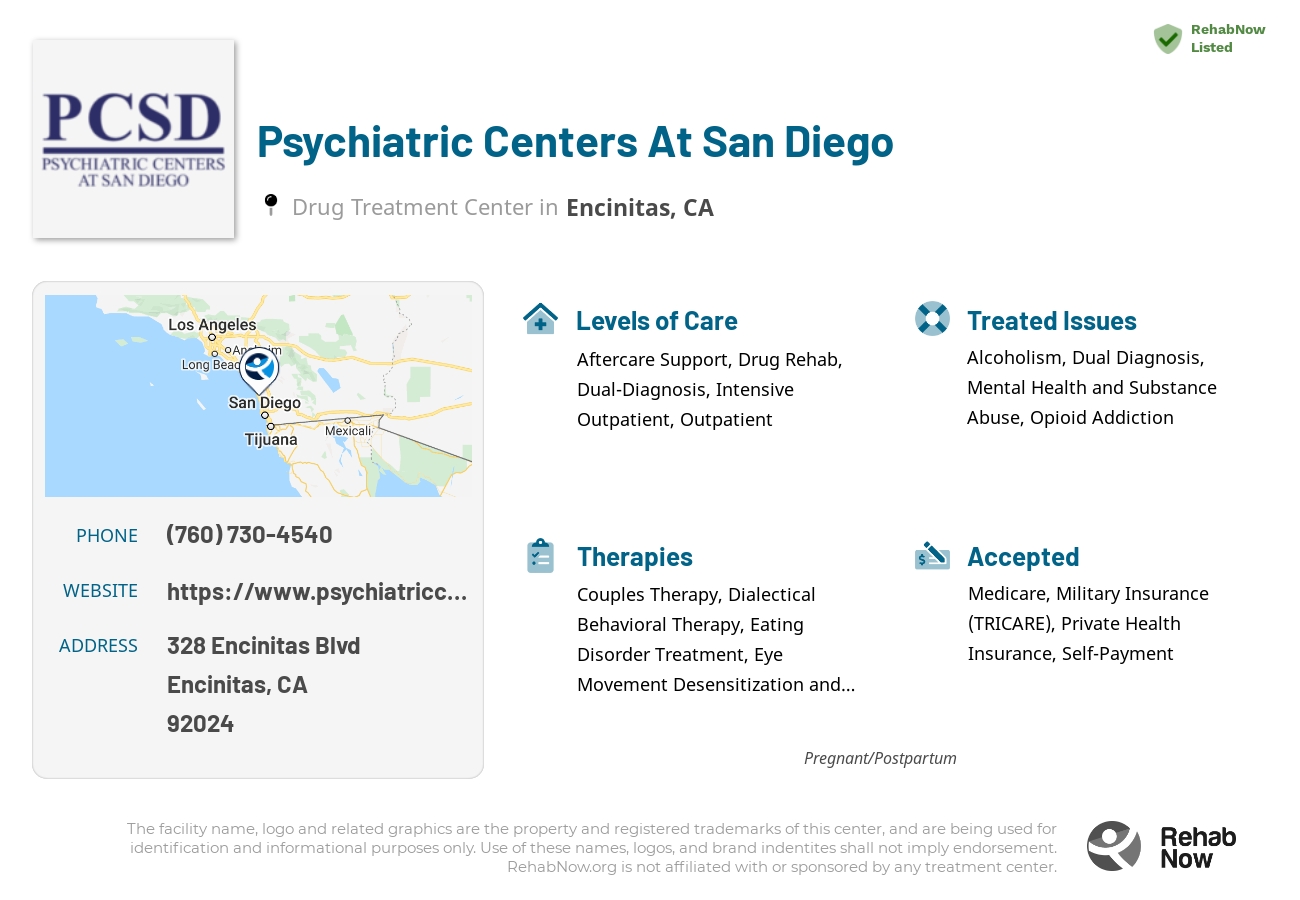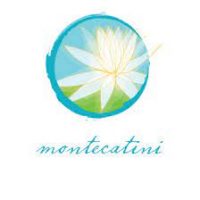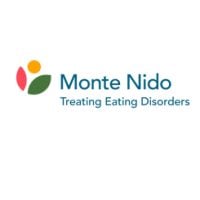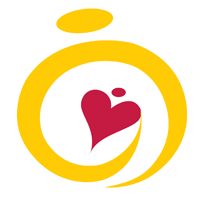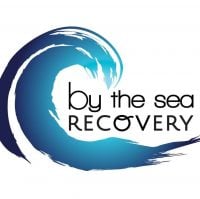About Psychiatric Centers At San Diego in California
Psychiatric Centers At San Diego in Encinitas, California is a treatment facility that specializes in helping individuals struggling with alcoholism, opioid addiction, dual diagnosis disorders, eating disorders, and drug addiction. Their mission is to provide comprehensive and effective treatment options to those seeking recovery. With a range of services available at different levels of care including aftercare support, drug rehab programs, dual-diagnosis treatment, intensive outpatient programs (IOP), and outpatient therapy sessions; they tailor their approach to meet the unique needs of each individual.
At Psychiatric Centers At San Diego in Encinitas California, individuals seeking help for addiction and substance abuse can find a range of services designed to address their specific needs. They offer evidence-based treatments such as counseling and therapy sessions that help clients understand the root causes of their addiction while developing healthy coping strategies. The facility also provides medical detoxification under supervision for safe withdrawal from substances like opioids or alcohol. In addition to individual therapy sessions with experienced clinicians who specialize in addiction treatment, group therapy sessions are available to foster peer support and encourage self-reflection during the recovery journey. Throughout all stages of recovery - from initial detoxification through intensive outpatient programs - Psychiatric Centers At San Diego offers compassionate care focused on lasting sobriety and improved mental well-being.
Genders
Ages
Modality
Additional
Conditions and Issues Treated
Treatment for opioid addiction is best made with the help of medical professionals who are experienced in dealing with these types of drugs. This treatment can involve medications, exercise, behavioral therapy, and counseling sessions. It is important to note that the effectiveness of treatments for opioid addiction vary, so it is vital to research which treatment options are suitable for each individual.
Many people who struggle with opioid addiction need to attend specific programs like methadone , Suboxone or Vivitrol clinics.
These types of programs will provide the patient with legal, prescription medications that can help them overcome their cravings for illegal opioids like heroin or fentanyl . If the patient has a chronic condition like Hepatitis C, they must undergo treatment before they can begin taking these medications.
Individuals who are addicted to drugs and/or alcohol often have one or more co-occurring mental health disorders. Addressing both the addiction and the mental health problems at facilities like Psychiatric Centers At San Diego can be very beneficial for these individuals.
Common mental health conditions that often co-occur with addiction include:
- Anxiety Disorders – People with drug and alcohol problems often suffer from anxiety disorders such as panic disorder, obsessive-compulsive disorder, social anxiety disorder, and generalized anxiety disorder.
- Depression – One of the most common mental illnesses co-occurring with addiction is major depressive disorder.
- Attention-deficit hyperactivity disorder (ADHD) – Many people with drug and alcohol problems also suffer from ADHD.
- Bipolar Disorder – People with bipolar disorder are more likely to suffer from drug and alcohol problems than the general population, and vice versa.
Levels of Care Offered
This center offers a variety of custom treatment tailored to individual recovery. Currently available are Aftercare Support, Drug Rehab, Dual-Diagnosis, Intensive Outpatient, Outpatient, with additional therapies available as listed below.
An intensive outpatient treatment program, or IOP, is set up for those struggling with an addiction to begin the recovery process. However, the patient will not live at the facility during treatment.
IOP involves patients coming in and out of a medical office building regularly to receive therapy and other services while continuing their life outside of these visits.
IOP is a step up from drug detoxification or alcohol detox. However, it’s still considered a phase of recovery rather than the ultimate goal. There are many rehabs and treatment facilities available to patients in need of IOP.
Outpatient treatment can be considered the lowest intensity level of addiction treatment in Encinitas, CA. It is ideal for early phase addiction or lower intensity addictions. Psychiatric Centers At San Diego peer group support, 12-step programs, and individual counseling are likely to be involved.
Aftercare support is vital to those who have completed a drug or alcohol treatment program. This support comes in individual and family counseling, treatment of psychiatric and other medical conditions, and medications to reduce cravings. It helps recovering addicts adjust to normal day-to-day activities and can last for a year or longer.
The majority of drug and alcohol addicts who receive aftercare treatment do not relapse. It is estimated that without aftercare, the relapse rate will be between 70 to 90 percent for most people. Aftercare is the final stage in addiction recovery, but it will also help maintain sobriety if relapse does occur.
Therapies & Programs
Individual therapy is ideal for addicts who want to focus on themselves. It can also be helpful for those whose withdrawal symptoms are exacerbated by the presence of other people.
Benefits of individual therapy are:
- Access to a personalized treatment plan that focuses on the individual needs of the addict
- More privacy during treatment sessions
- Better personal development through introspection
- Increased self-awareness regarding addictive tendencies in order to avoid relapse
- Greater potential for a long-term recovery plan
- Receiving professional advice and detox assistance from medical staff
Couples therapy is a treatment method used to help couples in which at least one member of the couple has a drug addiction. Couples therapy can be used whether the addicted partner is using drugs or in recovery. An additional benefit of couples therapy is that it can help make other types of treatment, such as 12-step programs, more effective.
Family therapy can help you and your family deal with old issues that may trigger substance abuse. The idea behind family therapy for drug addiction is that you are never fully healed from substance abuse until you’ve healed your relationship with your family, too. To get sober, you need to find a different way to cope with the pain in your life.
This is when a group of people in various stages of recovery meet up and discuss their experiences, triggers, successes, failures, and even alternative therapies! Unlike support groups where everyone already knows each other, group therapy is conducted along side outpatient or inpatient treatment at Psychiatric Centers At San Diego.
Trauma therapy is a clinical process that helps individuals deal with mental stress often caused by traumatic events. The therapist helps the person identify, understand and work through the problem. This is done with the help of talking about it in group or one-on-one counseling sessions.
Therapists use relaxation, role-playing, art, and music to help the person open up about what is bothering them. Some examples include:
- Talking about the traumatic event and how it affected them.
- Helping those who have PTSD to deal with their nightmares and recurring memories.
- Working with individuals to resolve the issues triggering the stress, whether seeing someone who reminds them of what happened or feeling helpless.
The individual is also encouraged to help others that are struggling with similar problems. This often helps them feel empowered and gives them hope.
Trauma therapy is not for everyone; it is usually reserved for people who have recently experienced a traumatic event and struggle to get over it. It is generally done for children, teenage victims of sexual assault, and war veterans.
Dialectical Behavior Therapy (DBT) is used by drug treatment centers across the United States to help drug addicts become sober. DBT is a type of Cognitive Behavioral Therapy (CBT) that combines traditional behavioral treatments with elements from DBT, including dialectics, distress tolerance, and interlocking issues. Some of the negative behaviors associated with addiction, such as impulsivity and mood swings, are addressed in DBT, while others like craving and isolation are not. It is commonly used to treat Borderline Personality Disorder (BPD) along with substance abuse disorders.
The four DBT modules are mindfulness, interpersonal effectiveness, emotion regulation, and distress tolerance:
- Mindfulness helps recovering addicts learn to identify and experience their emotions while realizing that they are not permanent.
- Interpersonal Effectiveness includes assertiveness, asking for what you need, and saying no while improving communication skills.
- Distress Tolerance has recovering addicts learn how to tolerate distress at the moment and avoid resorting to substance abuse.
- Emotion Regulation is used to identify, express and change emotions.
CBT is a psychotherapy approach and method. [ws-nap-name] people to examine how their thoughts, including habitual harmful and inaccurate thinking, affect their actions. CBT is based on the idea that rigid, inflexible thinking leads to poor stress management, which leads to emotional distress.
Similarly, CBT helps people identify and change negative behaviors. It makes you question your perceptions and ask if they are realistic. CBT asks people to examine their behaviors and emotional responses and how they affect their lives. CBT aims to change people’s thinking and behavior to lead a more balanced and healthy life.
Moreover, CBT has been shown to reduce anxiety disorders, depression, and symptoms associated with harmful thoughts or actions.
Eye Movement Desensitization and Reprocessing (EMDR) therapy is a treatment method that helps reduce the impact of traumatic memories on individuals. It involves following a bar of light or watching a therapist’s finger move back and forth. This mimics the eye movements of REM sleep, which allows the brain to reprocess memories. EMDR therapy is combined with behavioral therapies to address the root cause of the problem. This reduces the desire to escape painful memories with drugs.
EMDR is effective in reducing the craving one experiences while being treated for drug addiction. Studies have shown that patients who undergo this therapy use drugs less and stay sober for more extended periods than those who do not. It is also more beneficial than talk therapy and medication. This can be performed in combination with medications to reduce the adverse side effects. While some believe that it does not treat the root cause, studies have shown that therapy combined with medication brings in better results.
Those struggling with addiction can benefit from learning certain life skills. It is not as simple as quitting drinking or taking drugs and thinking that the hard part is over. Being sober means living a whole new way of life. Many recovering addicts have found that they need to develop talents like time management, organization, communication skills, socialization skills, and self-esteem to make their life in sobriety work, Psychiatric Centers At San Diego is here to help with that.
Payment Options Accepted
For specific insurance or payment methods please contact us.
Is your insurance accepted?
Ask an expert, call (888) 674-0062
Additional Details
Specifics, location, and helpful extra information.
Encinitas, California 92024 Phone Number(760) 730-4540 Meta DetailsUpdated November 25, 2023
Staff Verified
Psychiatric Centers At San Diego Patient Reviews
There are no reviews yet. Be the first one to write one.
Encinitas, California Addiction Information
More than 3 million of California's citizens are addicted to illegal drugs. Almost 800,000 people use hard drugs, almost 5 million use marijuana, and another 2.1 million abuse alcohol every year. Other substance abuse issues such as binge drinking and teen drug use are also common. Many illegal drugs such as cocaine, heroin, methamphetamine, and marijuana are smuggled into the state from Mexico.
The drug addiction problem in Encinitas, CA is not as bad as it is in other parts of the country, but it is still a problem. In 2014, there were over 3,000 drug overdose deaths in Encinitas, California. There are a lot of rehab facilities available in Encinitas. You can also find a lot of support groups in the area, that can help you to stay sober.
Treatment in Nearby Cities
- San Mateo, CA (422.3 mi.)
- Carlsbad, CA (8.5 mi.)
- Palmdale, CA (116.1 mi.)
- Downey, CA (78.7 mi.)
- Sanger, CA (284.0 mi.)
Centers near Psychiatric Centers At San Diego
The facility name, logo and brand are the property and registered trademarks of Psychiatric Centers At San Diego, and are being used for identification and informational purposes only. Use of these names, logos and brands shall not imply endorsement. RehabNow.org is not affiliated with or sponsored by Psychiatric Centers At San Diego.


